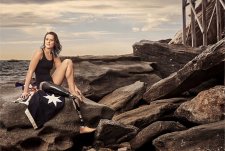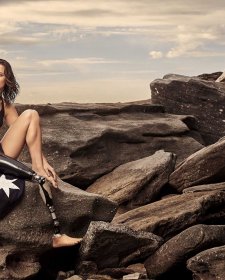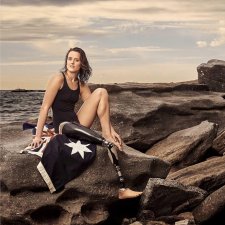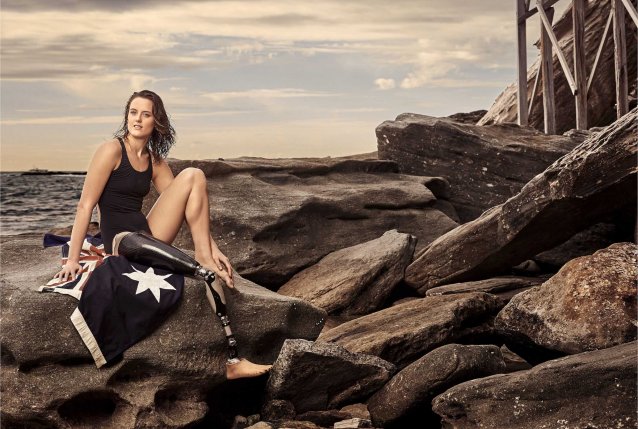Ellie Cole on the freedom of the pool and being photographed by Peter Brew-Bevan.
Swimming's one of those sports where you have your face in the water. You have no idea what's going on in the outside world. And so you spend a lot of time with your mind. When times are really hard, you just jump in the pool and you think things over. If you've got a biology exam coming up, you jump in the pool and you think things over. If you've had a fight with your partner, you jump in the pool and you think things over. So it's a really great pool of reflection, I guess you could say. I think that when you're young, you just wanna be accepted by all of your friends. And a way for me to do that was swimming.
For me, swimming was particularly special because it was the only sport that I could participate in as a kid where I could take my prosthetic leg off, jump in the water, and I could be the same as all the other kids. And then I found after a while that I could actually be better than most of my friends at that sport. And it gave me a really great platform to show all of my friends at school that I could still achieve things in a physical sense, because I definitely wasn't running up and down beside them in the playground, but get me into a pool, and I'll beat you. That was always kind of the mentality that I had when I was younger.
And so for me, the pool was definitely a great place of freedom, but it was where I learned how to back myself, how to be resilient, how to show the world what I could do. And then I found my way onto the Paralympic team with that exact same attitude and have since seen how the Paralympics can show the world what their athletes do. The great thing about Paralympic swimming for me is that I see people who have no arms and no legs that are still swimming. And so for me to break a hip or to break a foot wasn't really a good enough excuse for me to stop swimming. I just had to find a different way to do things and be really creative. That's one of the things that I love about parasport.
Being a Paralympian is the best job in the world. So I get to wake up in the morning nice and early, and I have about 20 minutes to myself before I go to the pool. And then I usually jump in the pool right behind me here and swim for about two hours and then jump out of the pool and get about an hour of physiotherapy exercises done. And then, if time permits, I go home and have a nap. But usually I have other commitments. And then I'm back in the afternoon for another two-hour session. I guess you have to love the sport to swim four hours a day.
The most proud that I've ever been is when I won my gold medal in the 100-meter backstroke at Rio, because I had been racing for nine days, and I'd been chasing gold medals, but I'd always be getting touched out and getting silver, which is still great. But I got to day nine, and I had one last chance to win a gold medal. And I was so stressed out before the event that I locked myself in a toilet cubicle and had a mild panic attack and didn't think that I could go out there and race. And I got myself out of the toilet cubicle, and I walked onto the pool deck. And I jumped in, and I won the race. It was the greatest moment ever.
So I did that photo shoot with Peter right before the Rio Paralympic Games. And it was a moment where we really wanted to showcase the athletes of Australia that were going to the Olympics and the Paralympics. And so I was asked to do a photo shoot outside, which was really exciting for me to begin with. And then Peter put me on some really beautiful rocks with the Australian flag. And obviously, I'm very proud to be an Australian Paralympian, so to have the flag in that photo was really important to me. I guess he kind of wanted to show what I wanted to be when I was younger, which was a mermaid.
I always dreamed of being a mermaid when I was younger. And so to be able to capture that in a portrait, as well as the strength and showcasing my disability as well and combining that into my childhood dream, with the inclusion of being strong and powerful, was a really great photo for me. It's something that I've always looked back on and been really proud to have been involved in such a creation. But I always look at it and think, "That's not me." But it is. It's just beautiful. To be able to just showcase my disability is something that I can't really put into words.
When I was younger, I never saw people or role models that had a disability. It's really a dream come true, just to be able to show the world that you can still be a mermaid. You can still have a disability. You can still be a Paralympian. You can do whatever you like. Yeah. It's cool. I don't know how land people do exercises. Exercises on land when it comes with gravity and changes in blood pressure is really difficult. I really take my hat off to these land people.
Related people
Related information



Portrait Story
Magazine article by Ellie Cole AM, 2022For me, swimming was particularly special because it was the only sport that I could participate in as a kid where I could take my prosthetic leg off, jump in the water, and I could be the same as all the other kids.



The Gallery
Visit us, learn with us, support us or work with us! Here’s a range of information about planning your visit, our history and more!



Support your Portrait Gallery
We depend on your support to keep creating our programs, exhibitions, publications and building the amazing portrait collection!





